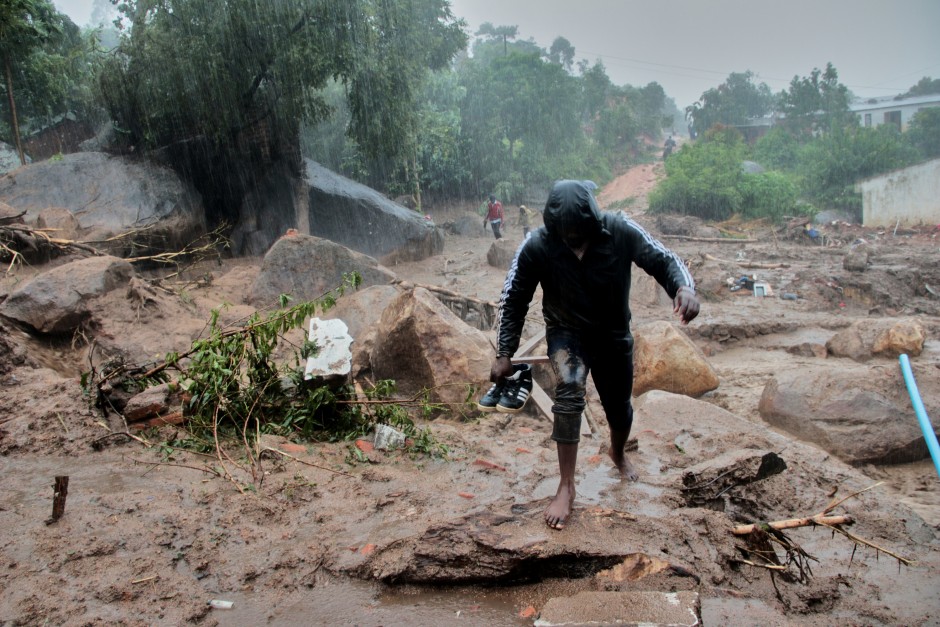With Cyclone Freddy’s return to Southern Africa’s mainland, which brought with it strong winds and torrential rain, more than 100 people have died in Malawi and Mozambique.
After originally striking in late February, Freddy returned over the weekend and tore through Southern Africa for the second time in a few weeks.
At least 99 people died in Malawi as a result of mudslides that washed away homes and their slumbering residents over the course of one night.
A further 134 people were hurt, and 16 are missing, according to reports. Blantyre, Malawi’s commercial center, reported 85 fatalities.
“We expect the figure to climb,” Charles Kalemba, a commissioner at the Department of Disaster Management Affairs, told a press conference on Monday.
There were 14 injuries and at least 10 fatalities in neighboring Mozambique.
The Mozambique National Institute for Disaster Management stated the fallout from the storm’s second landfall in the country was worse than expected.
Freddy, which developed off the coast of western Australia in the first week of February, was expected to become the longest-lasting tropical cyclone ever, according to the World Meteorological Organization of the UN. It spanned the whole southern Indian Ocean and pounded Madagascar from February 21 before reaching Mozambique on February 24.
After making what meteorologists refer to as a “rare” loop trajectory, Freddy moved once more near Mozambique before turning around and returning to Madagascar.
Leon-Eline and Hudah in 2000 were the last cyclones to cross the whole southern Indian Ocean.
More than 11,000 people, according to the UN, were impacted by the storm.
Malawi is suffering from the biggest cholera outbreak in its history, which has claimed more than 1,600 lives since last year, and the cyclone’s effects have made matters worse.
“State of calamity in the Southern region,” according to President Lazarus Chakwera, was declared across the nation. According to his office, the administration was responding to the problem and making a plea for national and international aid for the impacted families.
With the likelihood that rain and wind will continue to lash the nation’s south, schools in ten southern districts will stay closed until Wednesday.
After an incoming plane encountered terrible weather and was forced to return to the capital, Lilongwe, Malawi Airlines, the country’s national airline, announced that all flights to Blantyre have been canceled indefinitely.
The nation’s energy company also forewarned that electricity production would be unpredictable because hydropower plants would need to be temporarily shut down to avoid muddy water from damaging turbines.
Residents of the Chilobwe township in southern Malawi were searching for survivors in the muck with shovels or just their bare hands as Cyclone Freddy’s torrential rain showered down on them.
One neighbor who refused to disclose his name while assisting in the rescue effort claimed that government rescuers were tardy in showing up.
“The populace is overburdened. Honest Chirwa, the ambulance driver, stated that the situation was extremely challenging and that the rescuers lacked the necessary tools.
The severe storm caused flooding and mudslides that swept away homes and buried their occupants, severely damaging the underdeveloped municipality.
Several of the fatalities in Malawi occurred in Chilobwe, a hilltop community close to Blantyre, the country’s second-largest metropolis.
“Many homes were pulled down by a huge mudslide. A 16-year-old pupil named Donald Banda remarked, “That was horrible. He is one of roughly 100 locals looking for their neighbors, whether they are living or dead.
According to Banda, the mudslide struck overnight and left nothing standing. Several homes and the people who lived in them vanished almost instantly.
The majority of the homes in the area are made of mud bricks, making bad weather easily harm them.
The man, who requested anonymity, stated, “We have no choice but to do this all on our own. “People are dying, which is frustrating.”





